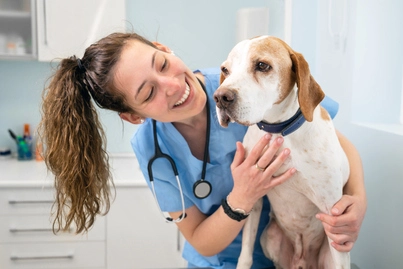Your dog keeps licking their lips and swallowing – for many pet parents; this is the first tell-tale sign there’s about to be a big mess on your floor. Dogs tend to lick and swallow excessively right before they vomit.
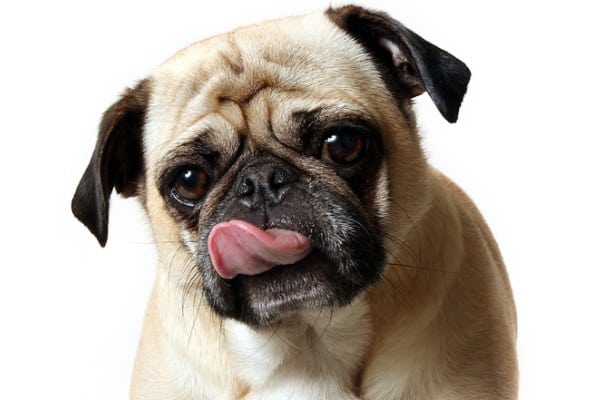
You know the drill; you either pull them by the collar away from carpeted areas or grab the nearest bucket to try to contain the mess.
But what if your dog’s licking, swallowing, or gulping behaviors don’t end in a puking fiasco?
That’s good news, right?
Well, sometimes. Cleaning vomit off of the floor isn’t how anyone wants to spend their evening.
But your dog gulping or licking their lips can be an indicator of something a little more complicated health-wise than an upset tummy and the subsequent eruption.
Contact a Vet?
Alternatively, you can quickly chat with a vet online now, which is both a cost and time savings.
Connect with a verified veterinarian in minutes. No waiting for appointments or office hours. No high fees. Your pet's health made convenient and worry-free.
Why Your Dog Keeps Licking Its Lips and Swallowing
Let’s go through the possible causes, symptoms, and remedies for any scenario that starts with your dog swallowing a lot.
The Simplest Explanation
You may not be thrilled about it, but dogs lick their lips and swallow most commonly because they’re getting ready to throw up.
Dogs sometimes get upset stomachs, just like we do. It can be a result of something as benign as carsickness or something more serious.
If your dog’s licking and gulping frequently result in vomit, there are several things to consider.
Warning, the following might be difficult for the faint of heart (and those who are about to sit down for a meal).
Parasites
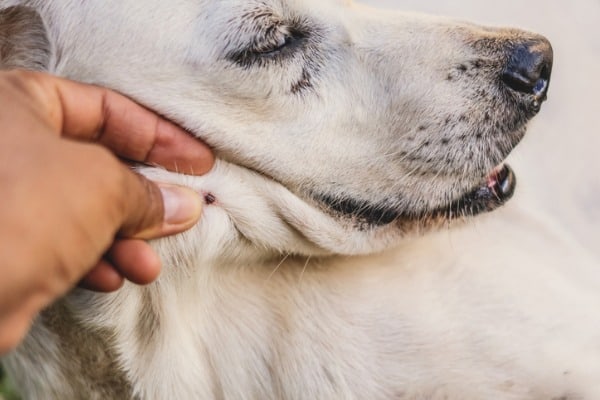
Any dog that doesn’t have regular anti-parasite medication is at risk for worms. It’s not pretty, but it’s usually easily treated.
You’ll want to check out this health issue quickly – not only for your pet’s benefit but for your own.
Yes, certain parasites can be transmitted to humans as well.
If your dog isn’t medicated against parasites and is either vomiting or dry heaving frequently, it’s time to have a vet test them for common worm infestations.
Head Trauma
Just like in humans, vomiting can be a symptom of a head injury or concussion.
If your dog has had an accident recently – a fall down the stairs or even a scrap with another dog – vomiting could indicate something serious.
Food Allergies
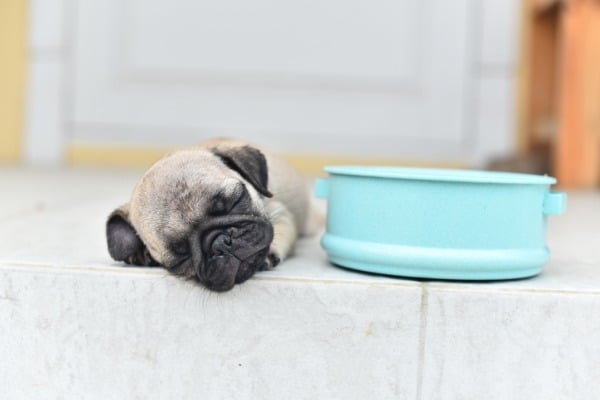
Your dog could be throwing up their meal because they’re sensitive to something in their food.
Certain proteins might be upsetting your dog’s stomach, and throwing up right after they eat is a red flag that their food is to blame.
Food allergies might seem scary, but they’re treatable. With the guidance of a vet, your dog can get on a food regimen that they can keep down, and you’ll save your floors in the process.
They Have an Infection
Illnesses can cause retching and vomiting in dogs, just like they can in people.
If your dog is up-to-date on all recommended vaccinations, then the most serious causes can be ruled out. If not, a trip to the vet is in order.
When Is It an Emergency?
There are a few scenarios that require immediate vet treatment.
For instance, a puppy vomiting can become dehydrated and very ill quickly, so it’s important to get a diagnosis as soon as possible.
A dog attempting to vomit repeatedly but not producing anything, such as dry heaving, could have bloat.
This is a serious and potentially fatal condition and requires a vet’s care immediately.
Dogs that are throwing up blood or foreign objects also need to see a vet. They could have ingested something toxic or something that’s obstructing their gastrointestinal system.
They Have a Cleft Palate
This birth defect is usually detected in newborn puppies and can be challenging to navigate.
Many puppies have difficulty surviving to adulthood if born with cleft palates.
And even more upsetting is the fact that some irresponsible breeders consider puppies born with this defect as “damaged goods.”
What Does That Mean for Puppies and Adult Dogs Who Have a Cleft Palate?
We can only hope that breeders are committed to seeing a newborn puppy through this difficult time – they will have great difficulty nursing and need hand-rearing.
Many breeders will turn the puppy over to a vet or rescue, where they stand a chance at surviving until corrective surgery is possible.
Strays or rescues with mild cleft palates can end up in shelters and subsequently be adopted. It can cause some issues with eating, and swallowing or gulping is a common symptom.
I Have a Puppy or Dog With a Cleft Palate – Now What?
Surgery is usually necessary to give a dog with a cleft palate a good quality of life. Eating and breathing can both be uncomfortable, so they live with annoying symptoms until the defect has been corrected.
In the meantime, puppies can be fed with a special bottle or feeding tube. Adult dogs might need nutrient-dense diets, as the condition can cause a lack of appetite or feeding and weight loss.
It’s Gastroesophageal Reflux Disease
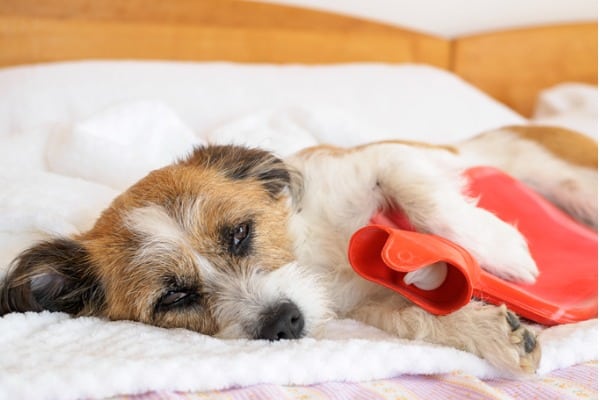
You’re not the only one who can suffer from heartburn – your four-legged best friend might have some of the same painful symptoms you’ve experienced.
And it can cause them to lick and gulp repeatedly.
Sometimes the excessive swallowing leads to sudden regurgitation of mostly bile – and beware, it can be projectile.
But sometimes, it just looks like your dog keeps swallowing obsessively.
There are several causes of Gastroesophageal Reflux Disease or GERD.
It could be the result of recently undergoing anesthesia or a congenital defect called a hiatal hernia.
How Can You Tell if GERD is Affecting Your Pup?
Aside from swallowing and licking, they might regurgitate or vomit often.
They could also lick random objects, such as furniture or floors, or even you, in an attempt to soothe the discomfort they’re experiencing.
A diagnosis from the vet, which might include sending a camera down your dog’s esophagus, is the only way to know for sure if your dog has GERD.
What’s the Prognosis?
There’s good news: this is a perfectly manageable condition, with the right medications and vet’s wisdom.
Sometimes prescription-strength drugs are the solution, but in many cases, simple diet adjustments and supplements can cause symptoms to disappear.
They’ve Swallowed a Foreign Object
Dogs tend to lap up things that aren’t food. Sometimes it’s an accident; others, it’s out of curiosity.
All sorts of weird things have been removed from dogs’ digestive tracts, from sewing needles to fishing hooks.
Sharp objects run the risk of becoming stuck in your dog’s mouth or even their throat. They might be licking and gulping in an attempt to dislodge something they ate.
How to Tell if Your Dog Swallowed Something
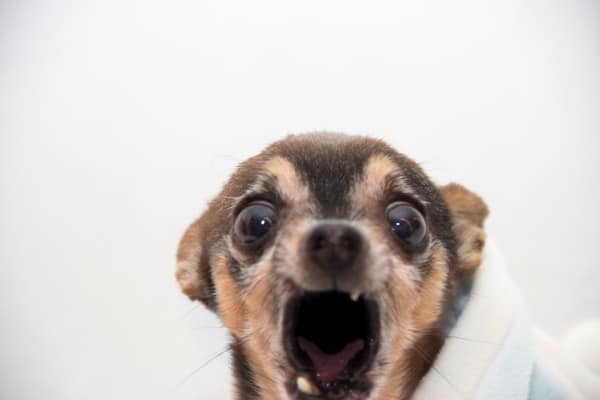
If your dog keeps swallowing and gulping but is not showing signs of needing to vomit, you can try to inspect their mouth for something embedded in there.
Some pet owners don’t feel comfortable inspecting their dog’s mouths and leave it to the vet.
Either way, a vet or a vet assistant can remove a foreign object from your dog’s mouth or throat.
At the vet’s, they can be sedated, which is much safer and easier for everyone involved.
What if a Sharp Object Isn’t the Culprit?
Dogs can swallow all kinds of non-food items that can make them feel sick.
Toys, clothing, bedding and bed fillers and plants are all frequently ingested by some dogs, and if they’re acting odd, those things could make them uncomfortable.
An intestinal obstruction can be serious and requires swift diagnosis and treatment.
A common scenario for many dog parents: you come home, and a favorite toy has been disemboweled. A couch has been relieved of its stuffing. A rope toy seems to have halved in size.
If any of these circumstances include a dog who is gulping, licking, or swallowing, they could be experiencing discomfort associated with some gastrointestinal blockage.
You Haven’t Been Brushing Their Teeth
Or rather, you haven’t been brushing their teeth.
It might seem silly, but oral care is actually an important part of maintaining your dog’s overall health.
Dental issues can cause discomfort in the mouth, and your pet might seem to develop a full-on dog gulping disorder.
Bad breath, yellow and brown or broken teeth, and gum color can all be signs that something is causing pain in your dog’s mouth.
A Trip To the Doggie Dentist Might Be in Order
Prevention is the best way to avoid dental issues, but there are specialists trained to care for your dog’s oral health.
Many regular vets are qualified to provide basic dental care for your dog, including cleanings administered under light sedation.
Gingivitis and inflamed gums, and everything in between, are enough to cause your dog constant discomfort, especially around feeding times.
Plus, waking up to bad breath in your face probably isn’t the way you want to start your day. We’d all like to cuddle our dogs without having to hold our noses.
In the case of a more acute disease, a vet who specializes in dentistry can offer options to help get your dog feeling better.
What’s the Best Way to Keep My Dog’s Teeth Healthy?
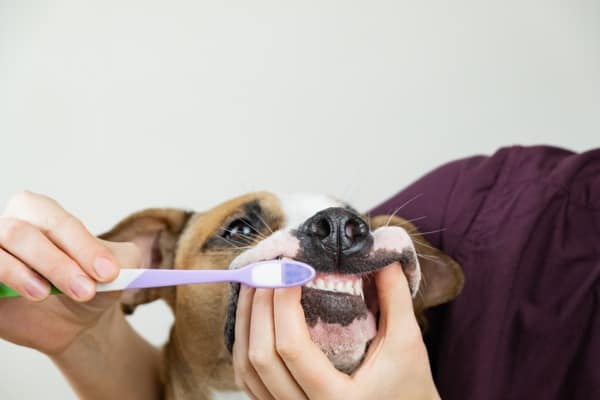
Ideally, you should brush your dog’s teeth regularly. You can buy from a wide variety of dog-friendly toothbrushes and toothpaste.
The products you use on yourself aren’t ideal and can be very offensive to dogs – many of them despise mint flavors.
You don’t have to commit to daily brushing just yet. Treats and toys are also available, which are specially designed to promote oral health.
Avoid giving your dog sugary treats regularly. Aside from putting their teeth at risk, it can wreak havoc on their weight and internal systems.
But if you want to spoil your baby with, say, frozen yogurt on special occasions, be sure to brush their teeth after.
Just remember to share sugary human treats sparingly and keep the chocolate for yourself.
There’s a Behavioral Reason
Just like licking their butt, a dog swallowing and licking their lips frequently might not have any medical cause in a dog. They can lick when they’re confused or stressed.
They can also lick as a sign of submission to other animals. Rapid licking when being approached by another dog is a way of saying, “I’m friendly – I won’t fight with you.”
Puppies often display this behavior, but adult dogs can as well.
It’s sometimes followed by swallowing, but a dog swallowing hard multiple times isn’t typically a behavioral display.
Dogs in training might lick their lips and occasionally swallow if they don’t understand what you’re trying to teach them.
Understanding when your dog is puzzled by something is the first step toward adequate training.
They’re actually quite good at communicating with us. It’s learning their language that can present a challenge.
But learning these subtle cues your dogs give you, such as licking, can be helpful in thinking on their level.
Keep An Eye on Their Tongue
Although you should consult with your vet anytime your dog displays unusual symptoms, the causes of licking and swallowing are usually easy to diagnose and treat.
Remember the accompanying symptoms of the more serious conditions.
And we’re sorry – but if the licking and gulping come with vomit, you might have to inspect it yourself to be sure it does not cause alarm.
When your dog keeps swallowing, you will understandably be concerned something is making them uncomfortable.
Just don’t forget that your dog relies on you for most of their care.
So even if their symptoms don’t seem overly concerning, it’s up to you to keep on top of the situation and get them any medical help they need.
If your dog keeps licking its lips and swallowing, it’s clear this could be a more complicated issue or easily dealt with – But you’ll rest easier knowing you’re doing everything you can to help comfort them.
And just so you know – if your dog is licking you, it could simply be their way of saying, “hi, I love you!”
If you ask us, a little dog slobber is a small price to pay for that kind of unconditional love.

